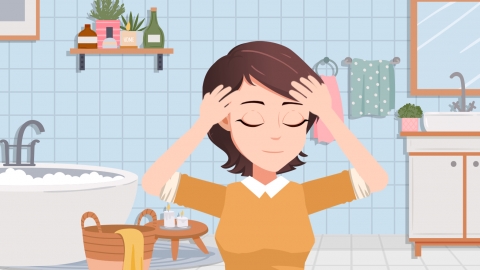What causes intermittent pain in the scalp?
In general, episodic scalp pain may be caused by stress and tension, weather changes, folliculitis, trigeminal neuralgia, migraines, and other factors. Symptomatic management through general treatments and medication might be necessary. If discomfort persists, it is recommended to seek timely medical attention and undergo appropriate treatment under a physician's guidance. Detailed analysis is as follows:

1. Stress and Tension
When the body is in a state of tension or stress, muscles involuntarily tighten. This sustained muscular tension may lead to poor local blood circulation and stimulate nerve endings, resulting in pain, possibly accompanied by symptoms such as anxiety, insomnia, and headaches. It is recommended to relieve stress and tension through relaxation techniques such as deep breathing, yoga, and meditation.
2. Weather Changes
The human body has a certain ability to adapt to changes in the external environment, but some individuals are more sensitive to weather changes. These fluctuations may cause abnormal blood vessel constriction or dilation, affecting blood supply to the scalp and causing pain, possibly accompanied by symptoms such as headache and joint pain. It is recommended to maintain a comfortable indoor temperature, dress appropriately for warmth, and reduce the impact of environmental changes on the body.
3. Folliculitis
When hair follicles on the scalp become infected with bacteria, an inflammatory reaction may occur, causing localized redness, swelling, and pain. Symptoms may also include localized swelling, tenderness, and warmth. It is recommended to follow medical advice and use medications such as mupirocin ointment, fusidic acid cream, and compound polymyxin B ointment for treatment.
4. Trigeminal Neuralgia
The trigeminal nerve is the main sensory nerve of the face. When it is damaged or compressed, it may cause severe pain, including pain in the scalp area. The pain is usually sudden and sharp, possibly accompanied by facial muscle twitching, tearing, and other symptoms. It is recommended to use medications such as carbamazepine tablets, gabapentin tablets, and phenytoin sodium tablets under a physician's guidance for treatment.
5. Migraine
Migraine is a chronic neurovascular disease that may be triggered by multiple factors such as genetics, endocrine changes, and environmental influences. It manifests as episodic stabbing or pulsating pain in the scalp, possibly accompanied by symptoms such as nausea and vomiting. It is recommended to use medications such as nimodipine tablets, compound propranolol and caffeine tablets, and topiramate tablets under medical guidance to alleviate symptoms.
It is recommended to use a mild shampoo in daily life, avoid excessively hot water when washing hair, and gently massage the scalp with fingertips to help promote blood circulation.




